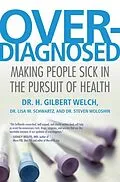Autorentext
Dr. H. Gilbert Welch is a professor at Dartmouth Medical School and a nationally recognized expert on the effects of medical testing. He has been published in the Los Angeles Times, New York Times, Washington Post, and Wall Street Journal, and has appeared on Today. In 2009, he received the Under Secretary's Award for Outstanding Achievement in Health Services Research. Drs. Lisa Schwartz and Steven Woloshin are associate professors at Dartmouth.
Klappentext
From a nationally recognized expert, an exposé of the worst excesses of our zeal for medical testing Going against the conventional wisdom reinforced by the medical establishment and Big Pharma that more screening is the best preventative medicine, Dr. Gilbert Welch builds a compelling counterargument that what we need are fewer, not more, diagnoses. Documenting the excesses of American medical practice that labels far too many of us as sick, Welch examines the social, ethical, and economic ramifications of a health-care system that unnecessarily diagnoses and treats patients, most of whom will not benefit from treatment, might be harmed by it, and would arguably be better off without screening. Drawing on twenty-five years of medical practice and research on the effects of medical testing, Welch explains in a straightforward, jargon-free style how the cutoffs for treating a person with "abnormal" test results have been drastically lowered just when technological advances have allowed us to see more and more "abnormalities," many of which will pose fewer health complications than the procedures that ostensibly cure them. Citing studies that show that 10 percent of two thousand healthy people were found to have had silent strokes, and that well over half of men over age sixty have traces of prostate cancer but no impairment, Welch reveals overdiagnosis to be rampant for numerous conditions and diseases, including diabetes, high cholesterol, osteoporosis, gallstones, abdominal aortic aneuryisms, blood clots, as well as skin, prostate, breast, and lung cancers. With genetic and prenatal screening now common, patients are being diagnosed not with disease but with "pre-disease" or for being at "high risk" of developing disease. Revealing the economic and medical forces that contribute to overdiagnosis, Welch makes a reasoned call for change that would save us from countless unneeded surgeries, excessive worry, and exorbitant costs, all while maintaining a balanced view of both the potential benefits and harms of diagnosis. Drawing on data, clinical studies, and anecdotes from his own practice, Welch builds a solid, accessible case against the belief that more screening always improves health care.
Inhalt
Introduction: Our Enthusiasm for Diagnosis Chapter 1) Genesis: People Become Patients with High Blood Pressure Chapter 2) We Change the Rules: How Numbers Get Changed to Give You Diabetes, High Cholesterol, and Osteoporosis Chapter 3) We Are Able to See More: How Scans Give You Gallstones, Damaged Knee Cartilage, Bulging Discs, Abdominal Aortic Aneurysms, and Blood Clots Chapter 4) We Look Harder for Prostate Cancer: How Screening Made It Clear That Overdiagnosis Exists in Cancer Chapter 5) We Look Harder for Other Cancers Chapter 6) We Look Harder for Breast Cancer Chapter 7) We Stumble onto Incidentalomas That Might Be Cancer Chapter 8) We Look Harder for Everything Else: How Screening Gives You (and Your Baby) Another Set of Problems Chapter 9) We Confuse DNA with Disease: How Genetic Testing Will Give You Almost Anything Chapter 10) Get the Facts Chapter 11) Get the System Chapter 12) Get the Big Picture Conclusion: Pursuing Health with Less Diagnosis Acknowledgments Notes Index
